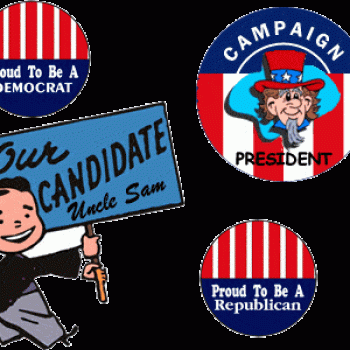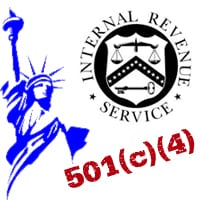As November approaches, more and more people will get involved in the political process. They will comment on Facebook, knock on doors, help register voters, or donate money to their preferred candidate(s). 501(c)(3) organizations have to be careful, however – under IRS rules, a 501(c)(3) cannot engage in the same kind of political activities as an individual or a for-profit corporation.
Why 501(c)(3) organizations are different
Nonprofits must agree not to engage in political activity in order to be exempt from federal income taxation and receive tax-deductible contributions, each a substantial subsidy from the federal government. The prohibition on political activity for nonprofits is right in the statute, which states that a 501(c)(3) must not “participate in, or intervene in (including the publishing or distributing of statements), any political campaign on behalf of (or in opposition to) any candidate for public office.” Note that the prohibition on political activity does not have a threshold, nor is its application limited to federal races. The prohibition applies to political activity in support of or opposition to the candidates for President of the Unites States, as well as to the candidates for the local school board and every political candidate in between. The IRS has published additional guidance that describes in greater detail what nonprofits can and cannot do, including 21 hypothetical fact patterns that are very illustrative
But what about the First Amendment?
Nonprofits are made up of individuals – employees, officers, board members, and volunteers. Each of those individuals has a first amendment right to express his or her political views. Where a nonprofit has to be careful, however, is when the individual expresses his or her views in a way which could be attributed to the nonprofit.
The easy example of an individual safely exercising her first amendment right is a CEO of a non-profit out to dinner with friends. She may voice her opinion about a presidential candidate without fear of jeopardizing the nonprofit’s 501(c)(3) status because no one around the table will reasonably assume that she was speaking in her professional capacity. If the same CEO were speaking as a representative of the nonprofit on a panel at a conference, however, she should not provide an opinion of any candidate. Of course, there are many possible scenarios which fall somewhere in between where nonprofits and their leaders need to be careful and possibly seek the advice of counsel.
What 501(c)(3)s Can and Cannot Do
Nonprofits are allowed to engage in non-partisan activities in the run-up to an election, such as voter registration drives or education around a particular issue – see our list below for a breakdown of specific activities that a 501(c)(3) can engage in. In addition, a 501(c)(3) is allowed to engage in lobbying (attempting to influence legislation) so long as the lobbying activity does not constitute a “substantial” part of its activities. Of course, “substantial” is a fuzzy term, so the IRS allows most nonprofits (but not churches) to set a monetary limit to their lobbying activity (called a 501(h) election) below which no tax penalties will be assessed, so that nonprofits have some certainty when their lobbying activities will trigger tax consequences.
What 501(c)(3) organizations CAN do
501(c)(3) organizations may safely engage in the following activities:
- Educate the public on issues and generally encourage participation in the political process.
- Make presentations on your organization’s issue to platform committees, campaign staff, candidates, media, and the general public
- Educate all candidates and political parties on your issues.
- Continue your normal lobbying on issues, subject to the limitations described above.
- Work on behalf of a ballot measure.
- Conduct or participate in a nonpartisan candidate forum, so long as the forum: (a) is open to all candidates, (b) is run in a balanced way, and (c) includes a broad range of nonpartisan questions for the candidates.
- Rent or sell mailing lists to candidates at fair market value, if made available to all candidates.
- Conduct voter registration drives and nonpartisan get-out-the-vote efforts, subject to the following limitations:
- Drives must be designed to educate the public about the importance of voting.
- Activities cannot be biased for or against any candidate or party.
- Nonprofits can target areas in nonpartisan ways. For instance, nonprofits may target low-turnout areas, low-income populations, minority populations, and students.
- Nonprofits may target registration and turnout efforts to the areas or people they serve.
What 501(c)(3) organizations CANNOT do
To maintain 501(c)(3) tax exempt status, organizations may not undertake the following activities:
- Endorse or oppose a candidate—implicitly or explicitly.
- Contribute money, time, or facilities to a candidate.
- Coordinate activities with a candidate.
- Restrict rental of your mailing list and facilities to certain candidates.
- Set up, fund, or manage a Political Action Committee (PAC), established under section 527 of the tax code mainly for electoral activity
These restrictions do not in any way prohibit officers, members, or employees from participating in a political campaign as private citizens, assuming those individuals ensure their actions or statements are not attributed to the organization.
If you are in any doubt regarding whether your organization’s activities might risk revocation of tax-exempt status, be sure to reach out to a lawyer with knowledge of the non-profit sector for specific advice.
- Perlman & Perlmanhttps://perlmanandperlman.com/author/nancyisrael/
- Perlman & Perlmanhttps://perlmanandperlman.com/author/nancyisrael/
- Perlman & Perlmanhttps://perlmanandperlman.com/author/nancyisrael/
- Perlman & Perlmanhttps://perlmanandperlman.com/author/nancyisrael/













